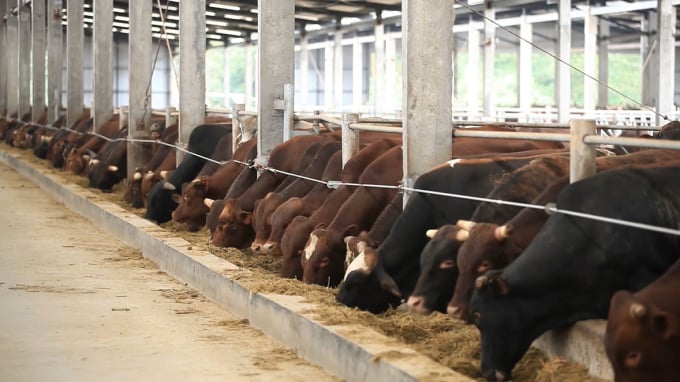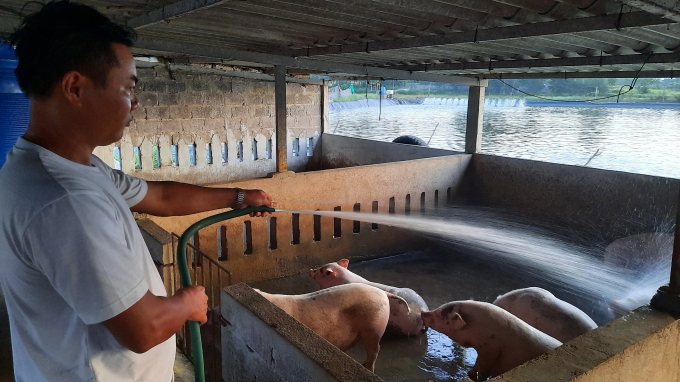June 19, 2025 | 12:33 GMT +7
June 19, 2025 | 12:33 GMT +7
Hotline: 0913.378.918
June 19, 2025 | 12:33 GMT +7
Hotline: 0913.378.918

Concentrated cow breeding area of Phu Lam Company (Mong Cai City). Photo: Nguyen Thanh.
Quang Ninh province has 24 cooperatives and 240 livestock farms certified for the farm economy. 28 establishments are VietGAP certified. 15 establishments were granted disease safety certificates.
The province is developing concentrated breeding areas, such as the pig breeding area in Mong Cai city with a 32-hectare scale; Tien Yen chicken breeding area with 850,000 chickens; and concentrated livestock and poultry breeding areas with a 1,341-hectare scale.
Due to the focus on sustainable livestock development, the province's livestock production value will increase by 7.6% in 2021 compared to 2020, accounting for 56.44% of the agricultural production value. The province has more than 27,600 buffaloes, over 34,000 cows, nearly 263,000 pigs, and more than 4,000,000 poultry herds.
Total meat production of all kinds for slaughter in 2021 was 97,344 tonnes and 27,451 tonnes in the first 3 months of 2022. The output of livestock and poultry meat in the province currently meets 70% of the province's consumption demand.
However, the development of household livestock production is mainly spontaneous, so it lacks stability and sustainability. In addition, the application of scientific and technical advances and vaccination against diseases for livestock has not been focused on, so productivity and efficiency of husbandry are low, and illnesses are easy to arise and spread.
The province currently has seven large livestock enterprises, such as Phu Lam Co., Ltd. with a scale of 10,000 - 12,000 cows; Thien Thuan Tuong Mining Joint Stock Company, scale 38,000 - 45,000 pigs, output 700 tonnes per month; Phuc Long Livestock Development and Agriculture, Forestry and Fisheries Development Joint Stock Company, the scale of 5,000 Tien Yen broodstock chickens.
The quality of livestock breeds provided to households is improved by mobilizing enterprises to invest in animal husbandry. Specifically, Thien Thuan Tuong Mining Joint Stock Company each month supplies about 11,000 breeding pigs of all kinds; Phuc Long Livestock Development and Agriculture, Forestry and Fisheries Development Joint Stock Company annually supplies 600,000 chickens.
Facing the complicated situation of diseases in livestock and poultry, localities in Quang Ninh province have focused on sustainably developing livestock, building safe breeding areas, and ensuring the quality of breeding animals.
The promotion of concentrated breeding has contributed to raising the number of cattle and poultry in the province next year higher than the previous year.

Quang Ninh province aims to reduce the number of small livestock models. Photo: Cuong Vu.
Recently, the People's Committee of Quang Ninh province adjusted the project of a high-tech concentrated cattle and poultry breeding area and an animal feed factory in Don Dac commune, Ba Che district, with a capital of 250 billion, on an area of more than 136 hectares.
The project aims to develop livestock production by applying science and technology associated with the effective use of local raw materials and agricultural by-products to create high-quality goods to meet domestic demand and export.
In addition, the implemented project will create jobs and increase incomes for workers, especially policy beneficiaries in Ba Che district in particular and neighboring districts in general, helping to stabilize their lives in rural areas and promoting the local agricultural economy.
All breeding pigs for the project are selected from the breeding pigs produced by Thien Thuan Tuong Company. This breed is imported from JSR Group - United Kingdom.
In the future, the project will accelerate the development of the livestock industry, creating a key breeding area, concentrated commercial farming area, and producing many high-quality cattle and poultry breeds, ensuring food hygiene and safety, meeting the breeder demand in Quang Ninh province and neighboring provinces.
To complete the production chain, animal and poultry feed is supplied from the project's processing plant. The feed required for lean pig breeding and livestock and poultry breeding is about 20 tonnes per day.
According to the plan, raw materials will be supplied to the livestock and poultry feed processing plant when the project comes into operation with a capacity of 250 tonnes per day.
In 2025, Quang Ninh province's livestock industry aims to develop scale, concentrated breeding areas, and critical products. In which, 28,300 buffaloes and over 43,000 cows; pig herd reached nearly 390,000 heads; building six concentrated breeding areas with synchronous infrastructure to attract about 200 organizations and individuals to invest in livestock development.
Besides building concentrated slaughterhouses, each locality has 1-2 establishments, reducing 80% of small slaughterhouses and ensuring 90% of cattle and poultry are slaughtered at these centralized slaughterhouses.
In particular, control and prevent diseases and strictly manage the use of banned substances in animal feed, improve the competitiveness of livestock products, develop specialty breeds, and create organic livestock products with a competitive advantage.
The Department of Agriculture and Rural Development of Quang Ninh province will also direct localities to relocate and eliminate livestock production facilities in densely populated areas that are not following the planning; resolutely handle violations against organizations, enterprises, individuals, and households using banned substances in livestock production.
Translated by Ha Phuc

(VAN) After 5 years of implementation, the CAI initiative has helped coffee growers change their farming practices, moving toward responsible agriculture that meets global export standards.

(VAN) The primary prerequisite for the comprehensive and robust integration of Vietnam's livestock sector into the global value chain is the establishment of a disease control system.

(VAN) The results of national programs are essential for establishing a contemporary livestock sector that is well-equipped to meet the demands of both domestic and international markets, with robust biosafety standards.

(VAN) The UNESCO Global Geopark revalidation of Non nuoc Cao Bang and the transition to a two-tier administrative model are presently undergoing a pivotal moment in Cao Bang, the northernmost province of Vietnam.
/2025/06/13/5330-2-004539_953.jpg)
(VAN) Changing policy mindset and removing investment barriers are urgent requirements to open up new development space for enterprises in the agricultural sector.

(VAN) The areas include the restoration of five million hectares of marine ecosystems.

(VAN) Dr. Le Van Nguyen, Director of the Institute of E-Commerce Management (ECM), emphasizes the potential for green development through the cultivation of fruit trees, particularly in provinces such as Son La.